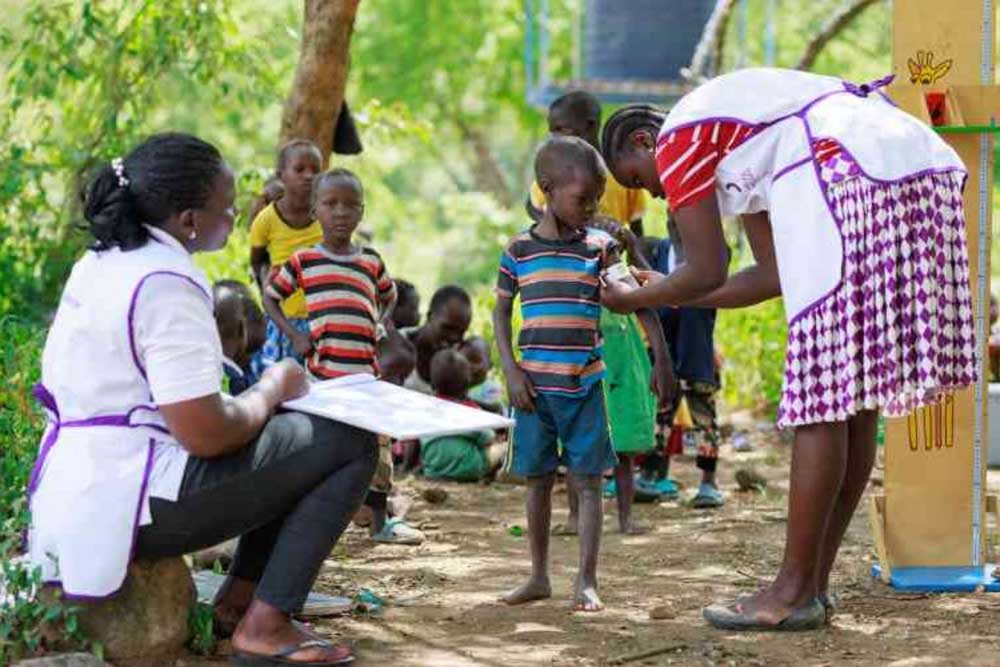(Source-tnx.africa-1)
In many African traditions, bracelets are worn by children as a charm to ward off evil spirits and as symbols of beauty. However,US NGO partners with baringo county to tackle malnutrition crisis ,in the small village of Embositit in Tiaty West Sub County, Baringo, these bracelets have taken on a new, life-saving role. The tri-colored mid-upper arm circumference (MUAC) bracelets are now being used as crucial detectors of malnutrition crisis among children.
Elizabeth Kavere, the nurse-in-charge at Kapunyany dispensary in Tiaty West, explains that these bracelets are a part of an integrated health outreach program initiated by Helen Keller International to combat malnutrition.
“The program was established in August 2023. If a child wears a green bracelet, it indicates they are well-nourished. A yellow or red bracelet signals moderate to acute malnutrition, requiring immediate treatment,” Kavere explained to a group of mothers gathered under a tree on a hot Monday afternoon.
Kavere’s role involves treating malnutrition crisis and educating mothers on how to use the MUAC bracelet to screen their children. This simple tool can prevent the worsening of a child’s health if used correctly.
The Malnutrition Crisis Challenge in Baringo
Malnutrition, defined as the deficiency, excess, or imbalance of energy and nutrients, is a significant issue in Baringo County. The County’s Nutrition Action Plan 2019-2023 reveals that Baringo North has an acute malnutrition rate of 9.3 percent, while Baringo South has a medium and severe The Malnutrition Crisis Challenge in Baringo
rate of 2.3 percent among children aged 6-59 months.
Health experts attribute these alarming rates to poor nutrition among pregnant and breastfeeding women, leading to premature births, low birth weight, stunting, and wasting in newborns. Children born to malnourished mothers are at a higher risk of developing chronic health problems and have an increased risk of mortality.
Kavere emphasizes the long-term impacts of acute malnutrition, noting that it can cause stunting—a permanent disability that results from insufficient nutrition during a child’s early years, leading to poor growth and slow development.
A Mother’s Story of Recovery
Nancy Maidong’, a 38-year-old mother, shared a personal story of how her three-year-old son, Aaron, nearly succumbed to acute malnutrition earlier this year. Aaron had lost his appetite, suffered from diarrhea, and was rapidly losing weight.
A Community Health Promoter (CHP), Fridah Makal, visited Maidong’s home and recommended that Aaron be taken to AIC Lodengo Health Centre, where free malnutrition treatment is provided. At the clinic, Aaron was diagnosed with moderate malnutrition and was placed on a treatment plan. Within four months, the little boy made a full recovery.
“My baby had lost almost all his weight. Initially, I suspected a mysterious illness until I learned it was malnutrition crisis,” Maidong’ recounted.
Lydia Tanui, a nurse at the health center, emphasized the importance of a nutrient-rich diet in Aaron’s recovery. She advised Maidong’ to provide her son with a diversified diet following the “four-star” nutrition program: starches (first star), animal proteins (second star), pulses (third star), and fruits and vegetables (fourth star).
The Ongoing Battle Against Malnutrition Crisis
Despite efforts to combat malnutrition, Baringo County continues to face significant challenges. According to Baringo County nutrition coordinator, Ann Kimwa, over 22,000 children in the county suffer from acute malnutrition. Of these, approximately 17,000 children have moderate malnutrition crisis, while over 5,000 suffer from severe malnutrition.
“Stunting in the county has decreased from 51 percent to 31.4 percent, but underweight remains above 30 percent. The major indicators of malnutrition in Baringo are stunting, underweight, and wasting,” Kimwa noted.
She also highlighted the issue of understaffing in healthcare facilities and the exacerbating factors of inter-community conflicts and poor food harvests due to unreliable rainfall.
To address the situation, Helen Keller International has partnered with Baringo County to support integrated medical outreach in ten mapped sites, aiming to improve the health and nutrition of children in the region.









